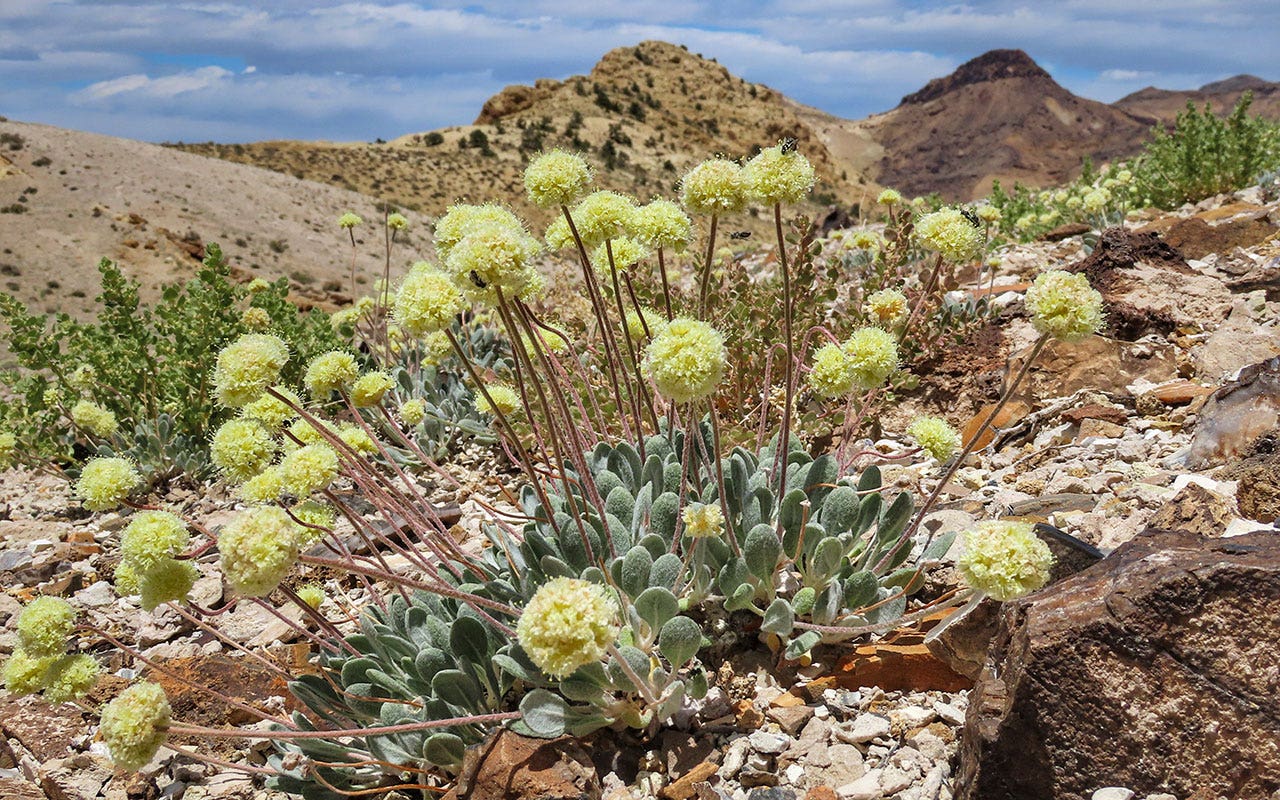Nevada
Biden admin advances review of Nevada lithium mine despite concerns over endangered wildflower

- The Biden administration has initiated an expedited environmental review for the Rhyolite Ridge mine in Nevada.
- Environmentalists vow to challenge the mine’s approval, arguing that it violates the Endangered Species Act and threatens the survival of an endangered wildflower.
- Nevada currently hosts the only existing lithium mine in the U.S., with another under construction.
The Biden administration has taken a significant step in its expedited environmental review of what could become the third lithium mine in the U.S., amid anticipated legal challenges from conservationists over the threat they say it poses to an endangered Nevada wildflower.
The Bureau of Land Management released more than 2,000 pages of documents in a draft environmental impact statement last week for the Rhyolite Ridge mine. Lithium is a metal key to the manufacture of batteries for electric vehicles — a centerpiece of President Joe Biden’s “green energy” agenda.
Officials for the bureau and its parent Interior Department trumpeted the news, saying the progress in the review of the lithium-boron mine project “represents another step by the Biden-Harris administration to support the responsible, domestic development of critical minerals to power the clean energy economy.”
LESSER-KNOWN ENDANGERED SPECIES IN THE US THREATENED BY FUNDING DISPARITIES
“Federal agencies cooperating to solve issues efficiently while protecting vulnerable species and other irreplaceable resources is exactly how we will need to move forward if we’re going to produce these critical minerals in the United States,” said Steve Feldgus, deputy assistant Interior secretary for land and minerals management.
This photo shows a Tiehm’s buckwheat plant near the site of a proposed lithium mine in Nevada on May 22, 2020. The Biden administration has taken a significant step in its expedited environmental review of what’s next in line to become only the third U.S. lithium mine, as conservationists fear it will lead to the extinction of the endangered Nevada wildflower near the California line. (Patrick Donnelly/Center for Biological Diversity via AP, File)
Environmentalists vowing to fight the mine say it’s the latest example of the administration running roughshod over U.S. protections for native wildlife and rare species in the name of slowing climate change by reducing reliance on fossil fuels and cutting greenhouse gas emissions.
Patrick Donnelly, Great Basin director at the Center for Biological Diversity, described it as “greenwashing extinction.” The nonprofit conservation group first petitioned in 2019 for federal protection of the rare flower, Tiehm’s buckwheat, which grows near the California line.
“We believe the current protection plan would violate the Endangered Species Act, so if BLM approves it as proposed, we almost certainly would challenge it,” he told The Associated Press last week.
SCIENTISTS SAY ENDANGERED SPECIES ACT IS AS ESSENTIAL AS EVER AFTER 50 YEARS OF SUCCESS
Nevada is home to the only existing lithium mine in the U.S. and another is currently under construction near the Oregon line 220 miles north of Reno. By 2030, worldwide demand for lithium is projected to have grown six times compared to 2020.
The bureau said it published the draft review and opened public comment through June 3 for the new mine after Ioneer Ltd., the Australian mining company that’s been planning for years to dig for lithium at this site, adjusted its latest blueprint to reduce destruction of critical habitat for the plant, which exists nowhere else in the world.
Bernard Rowe, Ioneer’s managing director, said lithium production could begin as early as 2027. He said the company has spent six years adjusting their plans so the mine can co-exist with the plant, invested $2.5 million in conservation efforts and committed an additional $1 million annually to ensure the plant and its surrounding habitat are protected.
“Rhyolite Ridge will help accelerate the electric vehicle transition and secure a cleaner future for our children and grandchildren,” Ioneer Executive Chairman James Calaway said.
In addition to scaling back encroachment on the 6-inch-tall (15-centimeter-tall) wildflower with yellow and cream-colored blooms, the strategy includes a controversial propagation plan to grow and transplant flowers nearby — something conservationists say won’t work.
The plant grows in eight sub-populations that combined cover approximately 10 acres — an area equal to the size of about eight football fields. They’re located halfway between Reno and Las Vegas in a high-desert oasis of sorts for the plants and the insects that pollinate them.
The Fish and Wildlife Service added the flower to the list of U.S. endangered species on Dec. 14, 2022, citing mining as the biggest threat to its survival.
Less than a week later, the government published a formal notice of intent to begin work on the draft environmental impact statement. Three weeks after that, the Energy Department announced a $700 million conditional loan to Ioneer for the mining project it said could produce enough lithium to support production of about 370,000 electric vehicles annually for four decades.
The Center for Biological Diversity said a series of internal documents it obtained from the Bureau of Land Management through a request under the Freedom of Information Act show the administration has rushed its review of the mine.
Scott Distell, BLM’s project manager in charge of the review, raised concerns about the expedited schedule in an email to his district boss when it suddenly was accelerated in December 2023.
“This is a very aggressive schedule that deviates from other project schedules on similar projects completed recently,” Distell wrote in the Dec. 22 email.
CLICK HERE TO GET THE FOX NEWS APP
The draft environmental impact statement lays out three different options for the project, including a “no-action alternative” that would mean no mine would be built. The one the bureau said it prefers anticipates Ioneer’s protection plan would allow for direct destruction of about 22% of the plant’s habitat in the 910 acres (368 hectares) the Fish and Wildlife Service designated as critical habitat when it listed it as endangered. That’s down from an estimated 38% in an earlier version of the plan.
“For an extremely rare species confined to such a small area, no amount of destruction of its critical habitat is acceptable,” said Naomi Fraga, director of conservation at the California Botanic Garden.
Donnelly points to the Endangered Species Act’s requirement that federal agencies consult with the Fish and Wildlife Service whenever a project could affect a threatened or endangered species to ensure it won’t “result in the destruction or adverse modification of designated critical habitat.”
“Reducing the destruction of this rare plant’s habitat from 38% to 22% is like cutting off one leg instead of both,” Donnelly said. “They’re still dealing a fatal blow to this precious, rare wildflower.”

Nevada
Amodei’s mining bill fails to pass Republican-controlled House • Nevada Current

Nevada’s lone congressional Republican suffered a blow this week after six members of his own party joined Democrats to block a bill he authored to address a court ruling adopting a stricter interpretation of the 150-year-old General Mining Law.
Mining developers looking to extract minerals in Nevada are grappling with the aftermath of a 2022 U.S. appellate court ruling that essentially restricted mining companies from dumping waste on federal lands.
While federal mining law allows companies to mine on federal land where economically valuable minerals are present, the federal court decision ruled that companies are not guaranteed the right to use adjacent federal land without valuable minerals for related purposes – such as waste rock disposal or running power lines.
The Mining Regulatory Clarity Act of 2024 — introduced by Nevada Republican Rep. Mark Amodei —would respond to the ruling by removing a provision in an 1872 federal mining law that mining companies must show a mineral deposit is present before building roads and other support facilities at a potential site.
However, the legislation died on the House floor Wednesday after a 210-206 vote to send the bill back to the House Natural Resources committee. Amodei’s office did not respond in time for publication.
Six hard-line Republicans — Andy Biggs and Eli Crane of Arizona, Dan Bishop of North Carolina, Bob Good of Virginia and Matt Gaetz and Anna Paulina Luna of Florida — voted with all Democrats to block the bill.
During floor debate, Republicans argued the bill was needed to clarify a 2022 federal appeals court decision that blocked approvals for mining support facilities at an Arizona copper mine.
“The decision limited the ability of the Forest Service to approve necessary mining support facilities and activity, which is necessary for mining operations,” Minnesota Republican Pete Stauber said Wednesday. The decision “put virtually every new domestic mining project in jeopardy.”
In Nevada, the appellate court ruling has the potential to send mining projects — years in the making — back to square one.
In the case of a planned molybdenum mine by Nevada-based developer Eureka Moly LLC, a district court judge vacated the 2019 Bureau of Land Management’s approval of the project after ruling the developer did not have the right to dump waste rock on federal land without valuable mineral deposits.
The new stricter interpretation of the 150-year-old General Mining Law, also affected what may potentially become the largest lithium mine in the United States, the Thacker Pass project south of the Nevada-Oregon border. Last year, a district judge cited the Arizona ruling when determining that federal land managers violated federal law when they approved the mine developer’s plan to bury 1,300 acres of public land under waste rock.
Prior to the court decision adopting a stricter interpretation of the 150-year-old General Mining Law, mining companies had been dumping mining waste on neighboring federal lands without issue for decades.
House Democrats argued Amodei’s bill would only benefit the mining industry by making it easier for companies to develop sites without documented mineral deposits. On the House floor, Democrats said the bill would give too much power to — and provide too little accountability for — mining companies that already work in a favorable regulatory environment.
New Mexico Democrat Melanie Stansbury said mining companies operate under an 1872 law that provides nearly unfettered access to lands that other extractive industries “could only dream of.”
Congress should be improving environmental protections to the 19th-century law, but the bill considered Wednesday would only weaken existing protections, she said.
“This bill removes the one frail safeguard that we have,” she said. “Under this bill, any American — or frankly any American subsidiary of a foreign company, including those that are located in adversarial countries — can put four stakes in the ground and on open public lands pay less than $10 an acre per year to have exclusive rights to that land, forever. Forever. This bill would create a free-for-all on our public lands.”
Both Republicans and Democrats in the U.S. Senate have described the federal appeals court decision as “a significant departure from long-held mining practices.” Last year, Nevada Sen. Catherine Cortez Masto has proposed a similar bill — the Mining Regulatory Clarity Act — that would make it legal to use part of a mining claim for mining related purposes on land without valuable minerals, including waste rock disposal.
Nevada
Palo Verde routs Sierra Vista in baseball — PHOTOS

Palo Verde rolled to a 12-2 home win over Sierra Vista in a high school baseball game Thursday. The game ended after six innings due to the 10-run rule.
RL Chandler went 2-for-3 with a home run and three RBIs for Palo Verde (21-10).
Palo Verde will next play in the 5A Southern Region playoffs next week as the Mountain League’s No. 2 seed. Sierra Vista (24-6) won the 4A Sky League title and will be a No. 1 seed in next week’s state playoffs.
Contact Alex Wright at awright@reviewjournal.com. Follow @AlexWright1028 on X.
Nevada
Nevada signs Wisconsin transfer Imbie Jones

RENO, Nev. (Nevada Athletics) – Nevada Women’s Basketball has signed forward Imbie Jones (Seattle, Wash. / Wisconsin), head coach Amanda Levens announced Thursday.
Jones, a Seattle native, was ranked a three-star recruit by ESPN and among Prospects Nation’s Elite 150 coming out of Garfield High School in 2023. At Garfield, Jones was a two-time state champion (2022, 2023) and three-time All-Metro selection (2020, 2022, 2023), highlighted by a first-team nod as a senior.
Jones spent her 2023-24 season at Wisconsin, appearing in 15 games for the Badgers. Wisconsin went 15-17 on the season, reaching the WNIT quarterfinals.
“Imbie is a great addition for us. We recruited her out of high school and are excited about the length and versatility she will bring to our team. We are excited to welcome Imbie into our Pack,” Levens said.
Jones is the third addition to the Wolf Pack’s 2024-25 roster, joining fellow transfer forward Amelia Raidaveta (Dubbo, New South Wales, Australia / Weber State) and November prep signee Kendra Hicks (Portland, Ore. / Jesuit HS).
Nevada women’s basketball will begin their offseason preparation and host various summer activities for the Northern Nevada community. The team’s annual golf outing fundraiser will take place Friday, June 21 at Wolf Run Golf Club. Nevada will also host three summer camps: Team Camp (June 22-23), Overnight Camp (July 23-25) and Elite Camp (August 2). More information can be found on NevadaWolfPack.com.
Copyright 2024 KOLO. All rights reserved.
-

 News1 week ago
News1 week agoLarry Webb’s deathbed confession solves 2000 cold case murder of Susan and Natasha Carter, 10, whose remains were found hours after he died
-

 World1 week ago
World1 week agoHaiti Prime Minister Ariel Henry resigns, transitional council takes power
-

 News1 week ago
News1 week agoFirst cargo ship passes through new channel since Baltimore bridge collapse
-

 World1 week ago
World1 week agoUS secretly sent long-range ATACMS weapons to Ukraine
-

 World1 week ago
World1 week agoSpanish PM Pedro Sanchez suspends public duties to 'reflect'
-

 News1 week ago
News1 week agoAmerican Airlines passenger alleges discrimination over use of first-class restroom
-

 Movie Reviews1 week ago
Movie Reviews1 week agoHumane (2024) – Movie Review
-

 Education1 week ago
Education1 week agoVideo: Johnson Condemns Pro-Palestinian Protests at Columbia University













